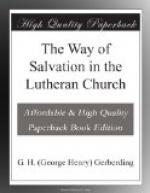“Though devils all the
world should fill,
All watching to devour us,
We tremble not, we fear no ill,
They cannot overpower us.
This world’s prince may still
Scowl fierce as he will,
He can harm us none,
He’s judged, the deed is done,
One little Word o’erthrows him.
“The Word they still
should let remain.
And not a thank have for it,
He’s by our side upon the plain,
With His good gifts and Spirit;
Take they then our life,
Goods, fame, child and wife;
When their worst is done,
They yet have nothing won,
The Kingdom ours remaineth.”
CHAPTER XVIII.
CONVERSION, ITS NATURE AND NECESSITY.
Closely related to the doctrine of the power, or efficacy, of the divine Word—as considered in the last chapter—is the doctrine of conversion. It is the subject of conversion, therefore, that we now purpose to examine. It is an important subject. It deserves a prominent place in treating of the Way of Salvation. It is also an intensely personal subject. Each one who desires to be in the Way of Salvation is personally interested in it. The eternal destiny of every one who reads these pages is closely connected with the question whether or not he is converted. To be in an unconverted state, is to be in a state of great peril. The issues of eternity are involved in the final decision of the soul, in reference to this great subject. It is of the most vital importance, therefore, that each one examine and understand it.
And yet, strange as it may seem, there are few subjects concerning which those interested are more in the dark. Stranger still, often those who preach and talk most about it, who are loudest in proclaiming its necessity, know least about it. Ask them as to its meaning, its nature, its elements. Ask them who needs it, how it is brought about, and what are the evidences of its existence; and they give at best very confused and unscriptural answers. We therefore propose to examine it in the light of the Word of God, and may He, the Spirit of truth, enable us to know and believe its divine teachings!
What then is conversion? The original and simple meaning of the word convert is to turn—to turn about. This is also the meaning of the Latin word from which the English comes. The Greek word, which in the New Testament is translated “convert” or “conversion,” also refers to the act of turning. It is so translated quite frequently. Thus the same Greek word that is in some places translated convert, is in other places translated turned, e.g., as in Mark v. 30: “Jesus ... turned him about in the press.” Acts xvi. 18: “But Paul ... turned and said.” Matt. xii. 44: “I will return into my house.” Acts xxvi. 18: “To turn them from darkness to light.” And so in many other places. It is plain, then, that the meaning of the word is a turning or facing about—a returning, or a changing of direction—as if a traveler, on finding himself going the wrong way, turns, returns, changes his course, comes back, he converts himself.




